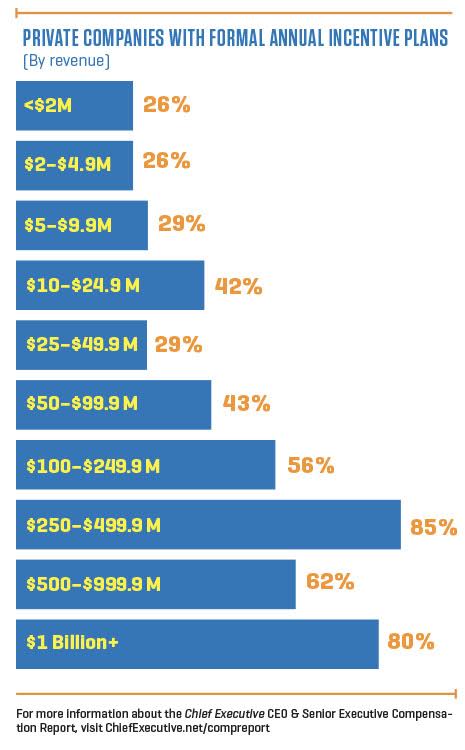According to Chief Executive’s CEO compensation report, many companies follow best practices for motivating CEOs and other senior executives, but most don’t. Larger private companies, along with private equity- and venture capital-owned companies, as well as employee-owned companies, are likely to follow best practices for pay, but others are lagging behind.
Our survey found that 40% of companies do not have formal long-term incentive plans, and among those that do, a mere 23.5% use performance-based vesting rather than time-based vesting.
 This is not consistent with public company practices. Not surprisingly, our survey found that larger companies by revenue behave more like public companies (see chart above). Eighty-five percent of companies with revenues from $250 million to $499.9 million led the pack, followed by 80% for $1 billion companies and 625 for those between $500 million and $999.9 million.
This is not consistent with public company practices. Not surprisingly, our survey found that larger companies by revenue behave more like public companies (see chart above). Eighty-five percent of companies with revenues from $250 million to $499.9 million led the pack, followed by 80% for $1 billion companies and 625 for those between $500 million and $999.9 million.
Public company best practices can and should be applied to private companies, starting with:

0

1:00 - 5:00 pm
Over 70% of Executives Surveyed Agree: Many Strategic Planning Efforts Lack Systematic Approach Tips for Enhancing Your Strategic Planning Process
Executives expressed frustration with their current strategic planning process. Issues include:
Steve Rutan and Denise Harrison have put together an afternoon workshop that will provide the tools you need to address these concerns. They have worked with hundreds of executives to develop a systematic approach that will enable your team to make better decisions during strategic planning. Steve and Denise will walk you through exercises for prioritizing your lists and steps that will reset and reinvigorate your process. This will be a hands-on workshop that will enable you to think about your business as you use the tools that are being presented. If you are ready for a Strategic Planning tune-up, select this workshop in your registration form. The additional fee of $695 will be added to your total.

2:00 - 5:00 pm
Female leaders face the same issues all leaders do, but they often face additional challenges too. In this peer session, we will facilitate a discussion of best practices and how to overcome common barriers to help women leaders be more effective within and outside their organizations.
Limited space available.

10:30 - 5:00 pm
General’s Retreat at Hermitage Golf Course
Sponsored by UBS
General’s Retreat, built in 1986 with architect Gary Roger Baird, has been voted the “Best Golf Course in Nashville” and is a “must play” when visiting the Nashville, Tennessee area. With the beautiful setting along the Cumberland River, golfers of all capabilities will thoroughly enjoy the golf, scenery and hospitality.
The golf outing fee includes transportation to and from the hotel, greens/cart fees, use of practice facilities, and boxed lunch. The bus will leave the hotel at 10:30 am for a noon shotgun start and return to the hotel after the cocktail reception following the completion of the round.